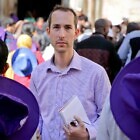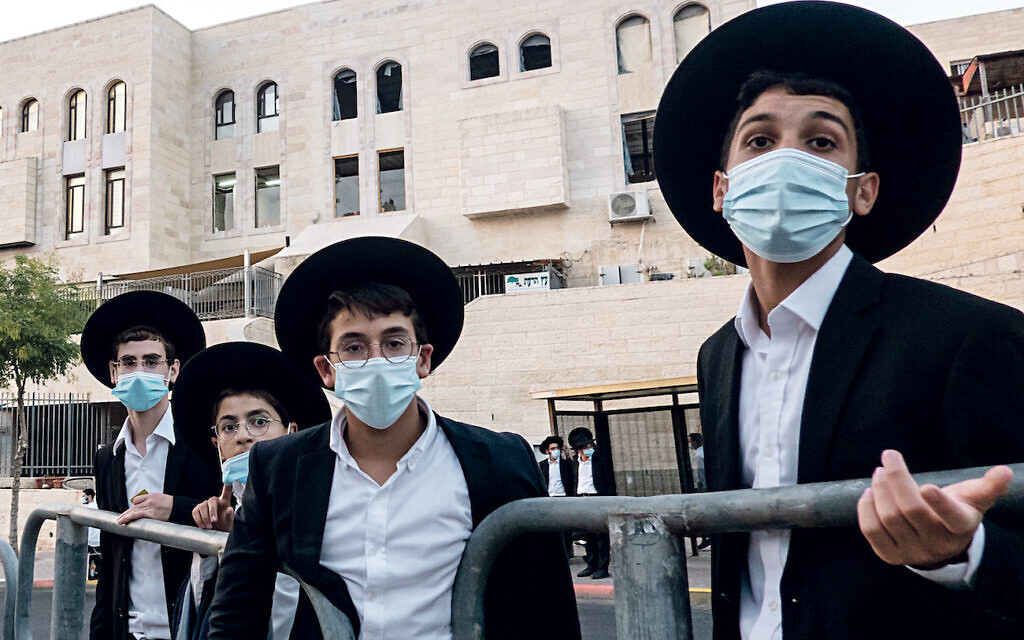ANALYSIS: Election will be a test of PM’s relationship with Charedim
Nathan Jeffay says Israel’s religious parties have become a liability at the polls
As shock spreads across Britain’s Jewish community over the phenomenon of lockdown-defying Charedi gatherings, in Israel the very same issue is emerging as a game-changer for the upcoming election.
Prime Minister Benjamin Netanyahu wants to fight the March ballot by highlighting a range of successes under his watch: Israel’s new ties with Arab states, security and the vaccination drive. But his opponents are determined not to let him set the agenda.
In the UK, the recent headlines about Charedi gatherings started in late January when police raided a Stamford Hill wedding. In Israel, it is the opposite: the biggest headlines are generated when authorities fail to stop gatherings. This week there were two mass funerals for Charedi rabbis, which police did not stop, and other gatherings have been taking place.
Get The Jewish News Daily Edition by email and never miss our top stories Free Sign Up
Netanyahu’s opponents are keen to shine a spotlight on this in campaigning, suggesting that the strictly-Orthodox sector gets special treatment by virtue of the relationship he has with its political leaders.
“This is what selective enforcement looks like,” fumed Avigdor Liberman, leader of the Yisrael Beytenu Party, after seeing funeral images. “Where is the prime minister? Where is the public security minister?” Benny Gantz, leader of the Blue and White Party, decried what he called “unequal” enforcement.
This sets the tone for the likely campaign refrain of the anti-Netanyahu camp. They will do everything possible to thrust his relationship with Charedi political parties into the spotlight. They will be suggesting that Netanyahu goes too far in pleasing them, even when it flies in the face of national interest. And they will emotively raise pandemic policy, and say that this proves their hypothesis.
All of which represents a major headache for Netanyahu. If he wants to return as prime minister he must perform well at the ballot box, and then win the recommendation of other parties to form a coalition and convince them to join it. His most trusty allies are the Charedi parties: United Torah Judaism and Shas.
But the paradox is that while he desperately needs his connection to these parties for the sake of power after the election, until voting day his alliance with them is an electoral liability. In other words, the very fact that these United Torah Judaism and Shas are waiting to rescue his political career makes him weaker at the ballot box and less likely to reach a situation that allows him to call in the favour.
Why are the Charedi political parties so unpopular with the mainstream Israeli public?
First, there is the coronavirus rule-breaking – which, it should be stressed is being seen in part, but by no means all, of Israeli’s Charedi community. The politicians are not seen as directing it, but they are seen as failing to step up to the plate as the political leadership of communities where it has become widespread in order to fight the trend. Many Israelis complain that by fighting against the escalation of fines for violations, they are sending the opposite signal.

Second, there is the influence on pandemic policy exerted though the legitimate political process, but decried by many as against national interests. It is widely argued that use of national lockdowns could have been reduced by strict local lockdowns in high-infection areas. But Charedi politicians scuppered this idea before the autumn lockdown, when it was clear that high-infection zones were heavily Charedi and they would have been disproportionately forced in to local closures.
And third, there are controversies that have been simmering for years, which are likely to be brought to the fore as other issues related to Charedi parties are raised. They include the continuation of widespread military exemptions for young Charedi men and objections over the extent of budgets to Charedi educational institutions.
Netanyahu wants, and needs, to appeal to the mainstream Israeli public if he is to get enough votes to be in with a shot of coalition-building. But the prospect of another government with the Charedi parties is widely regarded negatively, even among those who are most naturally inclined to vote for him, namely those on the right.
A poll conducted by the N12 new site concluded that some 52 percent of right-wing voters do not want a government with Charedi parties. Only 33 percent do want such a government. The overall results of the poll suggest that three out of five Israelis want to see a government that excludes Charedi factions.
But this is precisely the opposite of what Netanyahu is likely to deliver. Will he find a way to diffuse all of this? Will the politician who always seems to find a way out of a corner succeed in getting the public to draw a line between his reputation and anger towards Charedi parties, or steer campaigning towards other issues? This is emerging as imperative to his election success.

Thank you for helping to make Jewish News the leading source of news and opinion for the UK Jewish community. Today we're asking for your invaluable help to continue putting our community first in everything we do.
For as little as £5 a month you can help sustain the vital work we do in celebrating and standing up for Jewish life in Britain.
Jewish News holds our community together and keeps us connected. Like a synagogue, it’s where people turn to feel part of something bigger. It also proudly shows the rest of Britain the vibrancy and rich culture of modern Jewish life.
You can make a quick and easy one-off or monthly contribution of £5, £10, £20 or any other sum you’re comfortable with.
100% of your donation will help us continue celebrating our community, in all its dynamic diversity...
Engaging
Being a community platform means so much more than producing a newspaper and website. One of our proudest roles is media partnering with our invaluable charities to amplify the outstanding work they do to help us all.
Celebrating
There’s no shortage of oys in the world but Jewish News takes every opportunity to celebrate the joys too, through projects like Night of Heroes, 40 Under 40 and other compelling countdowns that make the community kvell with pride.
Pioneering
In the first collaboration between media outlets from different faiths, Jewish News worked with British Muslim TV and Church Times to produce a list of young activists leading the way on interfaith understanding.
Campaigning
Royal Mail issued a stamp honouring Holocaust hero Sir Nicholas Winton after a Jewish News campaign attracted more than 100,000 backers. Jewish Newsalso produces special editions of the paper highlighting pressing issues including mental health and Holocaust remembrance.
Easy access
In an age when news is readily accessible, Jewish News provides high-quality content free online and offline, removing any financial barriers to connecting people.
Voice of our community to wider society
The Jewish News team regularly appears on TV, radio and on the pages of the national press to comment on stories about the Jewish community. Easy access to the paper on the streets of London also means Jewish News provides an invaluable window into the community for the country at large.
We hope you agree all this is worth preserving.
-
By Laurent Vaughan - Senior Associate (Bishop & Sewell Solicitors)
-
By Laurent Vaughan - Senior Associate (Bishop & Sewell Solicitors)
-
By Laurent Vaughan - Senior Associate (Bishop & Sewell Solicitors)
-
By Laurent Vaughan - Senior Associate (Bishop & Sewell Solicitors)























